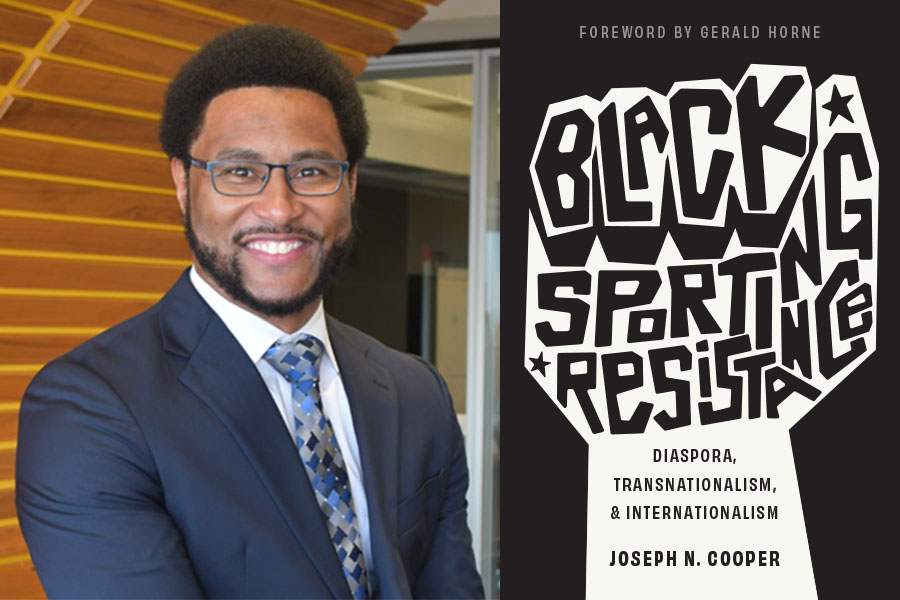- Home
- News
- Recent News
- Professor Joseph Cooper's New Book
Professor Joseph Cooper explores social change through sport in his new book, "Black Sporting Resistance: Diaspora, Transnationalism, and Internationalism"
“Across a range of sports and a range of geopolitical contexts, Black sportspersons have intergenerationally utilized their platforms to advance racial justice and social justice causes.”

Dr. Joseph Cooper, the inaugural Dr. J. Keith Motley Endowed Chair of Sport Leadership and Administration at UMass Boston, explores global sporting resistance in his third solo-authored book. He looks at how Black sportspersons (including athletes, coaches, spectactors, scholars, and organizers) around the world have used sport as a platform to advance racial and social justice causes across different cultures, countries, and eras.
“I'd like to spotlight the widely unknown or underappreciated aspects of Black resistance in and through sport,” said Cooper.
His recent book expands on themes he has explored in earlier works, From Exploitation Back to Empowerment: Black Male Holistic (Under)Development Through Sport and (Mis)Education (2019), and A Legacy of African American Resistance and Activism Through Sport (2021). These books primarily focus on the U.S. context, while Black Sporting Resistance broadens its scope to a global view of Black sportspersons who have ignited positive social change across diverse geopolitical and cultural settings.
Cooper presents a series of compelling examples of Black sportspersons who have used their platforms to protest racial inequality and oppression. The book examines figures such as Jack Johnson, the first heavyweight boxing champion, who advocated with the Australian Aboriginal Progressive Association before going into exile and fleeing to Mexico, where he worked with Mexican revolutionaries to challenge laws that were discriminatory against vulnerable populations.
Cooper similarly brings attention to the Colored Hockey League, founded by Henry Sylvester Williams in Nova Scotia in 1895. Williams, best known for founding the Pan-African Conference in 1900, played a pivotal role in establishing the Black Hockey League, formed by descendants of formerly enslaved African Americans and Jamaican Maroons. The league was deeply connected to Black churches and businesses. “It was very much this African diasporic ecosystem, and sport was a way to advance the racial justice cause of the day,” said Cooper.
The book also explores the international impact of Black sportspersons in movements such as anti-apartheid, anti-war protests, and Black Lives Matter. Cooper delves into the Harlem Renaissance, the New Negro era, Black Nationalism movement, and the rise of Black basketball teams and the Negro Leagues across North and Latin America. “During the early to mid-20th century, Afro-Latinos and African-Americans coalesced to create cooperative economics when mainstream Major League Baseball had a racist gentleman agreement that did not allow them to participate up until when Jackie Robinson broke the color barrier in 1947,” said Cooper.
Cooper’s new book highlights the potential of sport to create global alliances in the pursuit of human rights, racial justice, social justice, political and civil rights, and economic justice. Whether through boxing, cricket, rugby, racing, tennis, fútbol (also known as soccer), basketball, the Black baseball leagues, capoeira, or rodeo, athletes from all corners of the globe have used sport to advance collective struggles for human rights. By shedding light on these stories, Black Sporting Resistance invites readers to reconsider the power of sport as a force for global change.
“I hope readers walk away from this book inspired, and encouraged,” said Cooper. “I hope they are empowered to build international alliances with people who share similar human rights ambitions as they do.”
Cooper’s book serves as a testament to the power of Black resistance and activism in and through sport and its capacity to transcend national borders and cultural divides in the fight for justice.
